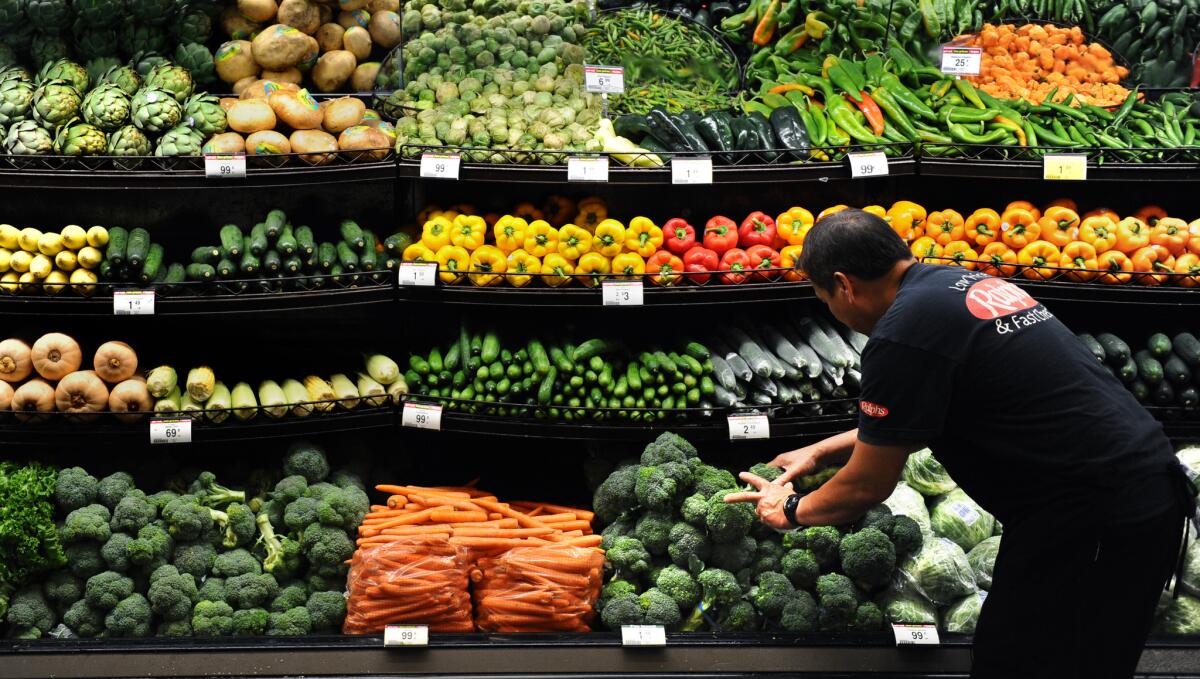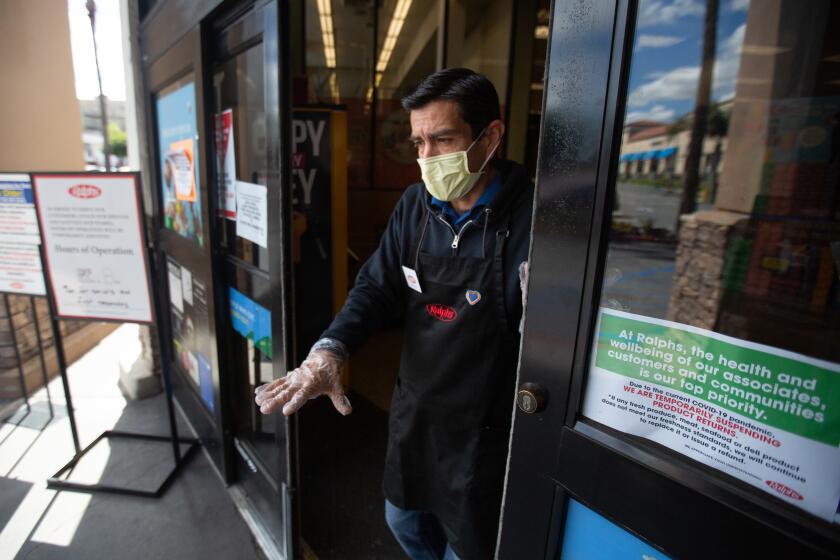As coronavirus spreads, how safe is a trip to the supermarket?

- Share via
Timothy Blair was shopping at a Ralphs supermarket in West Los Angeles the other day, and he had the same thought that I and possibly many other people have had while traversing the produce aisles.
Is it safe for all those fruits and vegetables to be out in the open, easily handled -- and put back -- by any number of strangers?
And what about the salad bars and prepared foods that have become staples of supermarkets? Even if the food’s safe, what about the serving utensils?
Are these not alarmingly easy ways for the coronavirus to be passed from one person to another?
“That tomato that you buy, how many hands were on it before you got it home?” Blair, 68, asked.
“There are no precautions, no signs, no warnings,” he told me. “Everything’s exposed.”
I wrote last week about the panic buying that’s surrounded many products — hand sanitizer, toilet paper, bottled water and so on.
Experts in consumer behavior say such stockpiling is understandable and not entirely irrational at a time when consumers are still coming to terms with the coronavirus.
Is it safe for all those fruit and vegetables to be out in the open, easily handled -- and put back -- by any number of strangers? What about salad bars and those tongs?
The question of supermarket food safety is one that’s received less attention but may be of growing concern as the virus spreads.
Marion Nestle, a professor emeritus of nutrition, food studies and public health at New York University, said that “so far there is no evidence that coronavirus can be transmitted by food.” She added, however, that it’s “theoretically possible.”
“Someone who has the virus but doesn’t show symptoms could cough or sneeze or handle raw foods,” Nestle said. “If you handle the foods before cooking them, you could pick up the virus.”
Michael T. Roberts, executive director of the Resnick Center for Food Law and Policy at UCLA, said even though there’s been scant official guidance on the risks of supermarket shopping, “everyone should be thoroughly washing their produce.”
He’s right about the official guidance, or lack thereof.
I reached out to the U.S. Department of Agriculture for safety tips on purchasing fruits and vegetables. A spokesman told me to contact the Food and Drug Administration.
I reached out to the FDA. No one responded.
A look at recent FDA press releases suggests the agency is much more concerned at the moment about the availability of drugs than questions of food safety, which probably isn’t a bad thing.
Marsha Cohen, a professor at San Francisco’s UC Hastings College of the Law who focuses on food issues, said she too was wondering about the safety of produce while shopping at Trader Joe’s the other day.
Like the other experts, she said there just isn’t enough information to make informed decisions, forcing consumers to go with their gut (literally and figuratively).
“It’s field-day times for paranoids and hypochondriacs,” Cohen observed.
Benjamin Chapman, an associate professor and food safety specialist at North Carolina State University, said he’s mainly concerned about the prepared foods at supermarkets.
The salads, pastas and whatnot may be protected from germs only by a sneeze guard, and typically feature tongs and serving spoons used by customers throughout the day.
“Everybody who grabs the tongs has the ability to transfer a pathogen,” Chapman observed.
Representatives of Ralphs, Trader Joe’s and Gelson’s didn’t respond to requests for comment Monday.
FMI, a food-industry trade group, has published tips for food retailers and wholesalers. The advice seems intended more to protect a business’ reputation than customers’ well-being.
“Given the massive media coverage a pandemic would generate, we should anticipate some degree of overreaction and irrational behavior, especially in the first two or three months,” FMI says.
“It will take some considerable time for consumers to adjust to the new realities of life during a pandemic.”
The World Health Organization says we’re not yet facing a pandemic, but point taken.
The coronavirus has given low-wage retail workers new visibility and leverage.
Along with anticipating increased demand for self-checkout and home deliveries, FMI advises food companies not to spook customers with unusual safety measures related to the coronavirus.
“Take steps to ensure that any protective steps you decide to implement (masks, gloves, etc.) aren’t perceived by consumers as reflecting a higher degree of risk in your operations versus a competitor slow to react,” it says.
Heather Garlich, a spokeswoman for FMI, told me that “even though COVID-19 is not thought to be foodborne, any person-to-person contact by infected individuals can allow for exposure.”
“Consumers should continue to practice personal hygiene and general food safety practices,” she said.
What that means is being extra careful.
I stopped by the same Ralphs that Blair visited, in Westwood Village across from UCLA. It seemed like business as usual in the produce section.
Looking closer, though, I saw one shopper pick up and examine a few apples, and then put them back. I saw another shopper casually snack on some grapes.
In ordinary times, that’s the sort of behavior that would barely register. In the age of the coronavirus, it’s hard not to wonder where the hands handling that produce have been, and whether they’re clean.
Over in the deli department, the prepared foods in the salad and buffet section all had tongs and serving spoons — in some cases sitting right on top of the food.
That sort of thing might not normally trouble most shoppers. Under the current circumstances, it gave me pause.
Every expert I spoke with said consumers should play it safe. Wash all fresh produce as soon as you get home. Wash or disinfect your hands after touching shared implements such as tongs and serving utensils, not to mention shopping carts.
Steps like these can stave off coronavirus, as well as bacteria like E. coli, salmonella and listeria, which can thrive on foods and contribute to an estimated 3,000 annual deaths in America.
Again, there’s no evidence that the coronavirus can be passed from one person to another via food.
But there’s plenty of evidence that viruses can be spread by touching something an infected person has touched. That could be a tomato. It could be a pair of serving tongs.
The supermarket, like the rest of daily life, has become an obstacle course. You’ll want to keep your wits about you.
More to Read
Inside the business of entertainment
The Wide Shot brings you news, analysis and insights on everything from streaming wars to production — and what it all means for the future.
You may occasionally receive promotional content from the Los Angeles Times.













